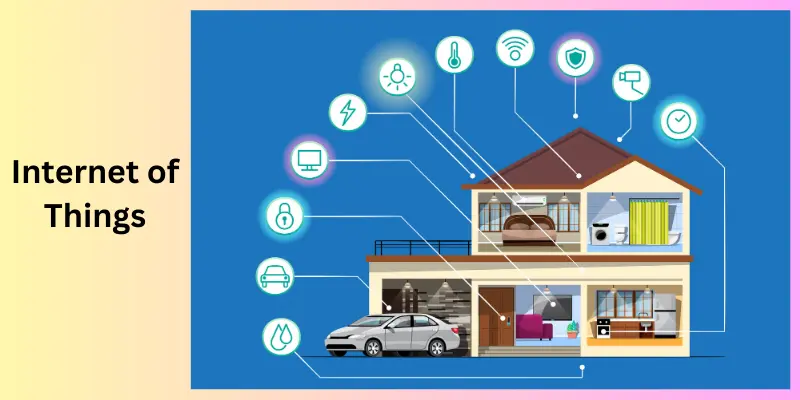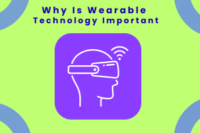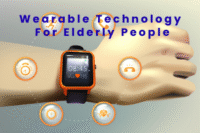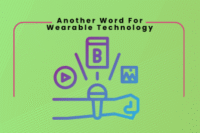What is The Internet of Things (IoT)?
Published: 12 Dec 2025
The Internet of Things (IoT) is a system where everyday devices connect to the internet to collect and share data. These devices include smartwatches, home security cameras, and even refrigerators. IoT allows them to communicate and automate tasks, making life easier and more efficient.
The Internet of Things (IoT) connects everyday devices to the internet, enabling them to collect and share data. From smartwatches to home security systems, IoT technology is revolutionizing industries and daily life. By 2030, experts predict that over 29 billion IoT devices will be in use worldwide. But what exactly is the Internet of Things, and how does it work?

Importance of IoT
The Internet of Things (IoT) is important because it makes life more convenient, efficient, and smarter. It connects devices like smartwatches, home security systems, and healthcare monitors to the internet, allowing them to share data and automate tasks. This helps businesses to improve operations, reduces human effort, and enhances decision-making with real-time data. IoT also plays a vital role in healthcare, transportation, and smart cities, making daily activities faster and more reliable.
How Does It Work?
IoT works by connecting smart devices to the internet to share and process data.
- Sensors collect data: they detect temperature, motion, health metrics, etc.
- Connectivity enables data transfer: uses Wi-Fi, Bluetooth, or cellular networks.
- Cloud processing analyzes data: Data is stored and processed for decision-making.
- Automated actions occur: Devices respond based on the data received.
- User control through apps: Users monitor and manage devices remotely.
Types of Internet of Things
IoT has different types based on its use in various industries. These types help improve daily life, businesses, and technology.
- Consumer IoT: Used in homes, like smartwatches and smart speakers.
- Industrial IoT (IIoT): Helps factories and industries with automation.
- Healthcare IoT: Includes smart medical devices for patient monitoring.
- Agricultural IoT: Tracks weather, soil, and crops for better farming.
- Smart City IoT: Manages traffic, lighting, and waste systems.
- Retail IoT: Improves shopping experiences with smart inventory tracking.
- Automotive IoT: Includes smart cars and self-driving technology.
For further detailed study about types of internet of things
What is the role of the Internet of Things in our lives?
The Internet of Things (IoT) makes everyday tasks easier and smarter. The role of the Internet of Things is given below:
- Smart Homes: IoT controls lights, security, and appliances.
- Health Tracking: Wearable devices monitor heart rate and fitness.
- Efficient Cities: Traffic lights and public transport use IoT to improve services.
- Business Growth: Companies use IoT to track inventory and machines.
- Energy Savings: Smart devices reduce electricity and water waste.
IoT makes life more convenient, efficient, and connected!
What is Internet of Things Security and Privacy?
Internet of Things (IoT) security and privacy protect smart devices and user data from cyber threats. As more devices connect to the internet, keeping information safe is very important.
- Data Protection: Stops hackers from stealing personal data.
- Device Safety: Prevents unauthorized access to smart gadgets.
- Secure Connections: Ensures safe communication between devices.
- Privacy Control: Gives users control over their personal information.
- Cyberattack Prevention: Blocks threats like malware and hacking.
What is Internet of Things and Its Applications
The Internet of Things (IoT) is used in many areas to make life easier, smarter, and more efficient. It connects devices to the internet, allowing them to collect and share data for better decision-making. Here are some common applications of IoT:
- Smart Homes: Devices like thermostats, lights, and security systems that can be controlled remotely.
- Healthcare: Wearable devices and remote monitoring tools to track health and improve patient care.
- Agriculture: Sensors and automated systems to monitor crops, soil, and irrigation for better farming.
- Transportation: Smart traffic systems, vehicle tracking, and connected cars for safer and more efficient travel.
- Industrial Automation: Machines and sensors in factories to improve production and reduce downtime.
- Energy Management: Smart grids and meters to optimize energy use and reduce waste.
- Retail: Smart shelves, inventory tracking, and personalized shopping experiences.
- Smart Cities: Systems for waste management, air quality monitoring, and public safety.
- Wearables: Devices like fitness trackers and smartwatches to monitor health and activity.
- Logistics: Tracking and managing goods in real-time for efficient supply chains.
IoT in Developed vs. Developing Countries
The Internet of Things (IoT) is used differently in developed and developing countries due to differences in technology, infrastructure, and resources. Developed countries use IoT for automation and advanced solutions, while developing countries focus on solving basic needs.
Developed Countries
- Smart Homes: Automates appliances, security, and energy use.
- Healthcare: Uses wearable devices and remote monitoring for better care.
- Industry 4.0: Enhances factories with smart machines and automation.
- Smart Cities: Manages traffic, waste, and energy efficiently.
Developing Countries
- Agriculture: Uses IoT for better irrigation and weather monitoring.
- Healthcare: Enables remote medical care in rural areas.
- Basic Infrastructure: Helps manage water, electricity, and transportation.
- Education: Provides digital learning tools to remote schools.
Advantages and Disadvantages of IoT
The Internet of Things (IoT) connects devices to improve efficiency, automation, and convenience. However, it also has drawbacks like security risks and high costs. When people ask, “Is the Internet of Things good or bad?” The answer depends on how it’s used. Here are the key advantages and disadvantages:
Advantages
- Automation and efficiency
- Improved data collection
- Better decision-making
- Remote monitoring
- Cost savings in industries
- Enhanced user experience
Disadvantages
- Security and privacy risks
- High implementation costs
- Device compatibility issues
- Data overload and management challenges
- Dependency on the internet
- Potential job losses due to automation
In conclusion, the Internet of Things can be both good and bad, depending on its implementation and management.
Importance of IoT Today and Its Future Impact
The Internet of Things (IoT) is transforming how we live and work by connecting devices for better automation, efficiency, and convenience. It is widely used in smart homes, healthcare, and industries to improve productivity and decision-making.
Future Impact of IoT
- Smarter cities with better traffic and energy management
- More advanced healthcare with remote monitoring
- Improved automation in industries and homes
- Enhanced security and data-driven insights
- Increased use of AI and machine learning for smart solutions
History of the Internet of Things (IoT)
The idea of IoT started in the early 1980s when a Coca-Cola vending machine at Carnegie Mellon University was connected to the internet. It could report stock levels and whether drinks were cold.
In 1999, Kevin Ashton coined the term “Internet of Things” while working at Procter & Gamble. He believed RFID (Radio-Frequency Identification) tags could help track products using the internet.
By the 2000s, companies like IBM, Cisco, and Google started investing in IoT. Smart devices, wearables, and home automation became popular.
Today, IoT is everywhere, from smart homes and healthcare to industries and transportation. It continues to grow, shaping the future of technology.
For further detailed study about the history of the Internet of Things
| Conclusion |
|---|
|
So guys, in this article, we’ve covered the Internet of Things (IoT) in detail. IoT is changing the way we live, making everyday tasks easier and businesses more efficient. I personally recommend exploring smart home devices like security cameras and voice assistants to see how IoT can improve your daily life. Stay informed about new IoT developments and start using them to your advantage. Want to learn more? Keep following our blog for the latest tech updates! |
FAQs
The Internet of Things (IoT) is used in many ways to make life easier. (IoT) connects smart devices like home assistants, fitness trackers, and security cameras to the internet. It helps automate tasks, improve efficiency, and enhance safety in homes, businesses, and industries.
The Internet of Things (IoT) is important because it makes life easier by connecting devices to work smarter. It helps in healthcare, smart homes, industries, and cities by improving efficiency and saving time.
Many big tech companies are making the Internet of Things (IoT), including Google, Amazon, Apple, Microsoft, and Intel. They create smart devices, software, and cloud services to connect everything.
The Internet of Things (IoT) means smart devices that connect to the internet and talk to each other. Examples include smartwatches, smart home devices (like Alexa), and fitness trackers. These devices make life easier by automating tasks!
The Internet of Things (IoT) is useful but not always secure. Hackers can steal data if devices are not protected. Using strong passwords and software updates helps keep IoT devices safe!

- Be Respectful
- Stay Relevant
- Stay Positive
- True Feedback
- Encourage Discussion
- Avoid Spamming
- No Fake News
- Don't Copy-Paste
- No Personal Attacks

- Be Respectful
- Stay Relevant
- Stay Positive
- True Feedback
- Encourage Discussion
- Avoid Spamming
- No Fake News
- Don't Copy-Paste
- No Personal Attacks



